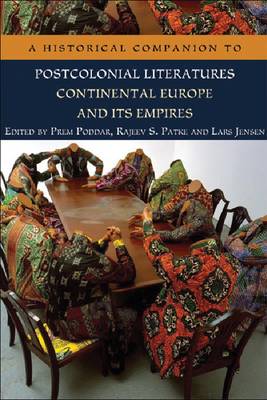
- Retrait gratuit dans votre magasin Club
- 7.000.000 titres dans notre catalogue
- Payer en toute sécurité
- Toujours un magasin près de chez vous
- Retrait gratuit dans votre magasin Club
- 7.000.0000 titres dans notre catalogue
- Payer en toute sécurité
- Toujours un magasin près de chez vous
A Historical Companion to Postcolonial Literatures - Continental Europe and Its Empires
340,95 €
+ 681 points
Description
Radical, intrepid, compendious, /A Historical Companion to Postcolonial Literatures/, goes far toward restoring 'postcolonialism' to its historical premises by resituating that imperial project in its much changed and still controversial cartographies. It is Marlow's map of the 'heart of darkness' drastically redrawn: what was once the 'vast amount of red, ' a 'deuce of a lot of blue, ' a 'little green, ' those 'smears of orange, ' and the 'purple patch, ' is here become a dense kaleidoscope that will of necessity rechart the itinerary of students and critical travellers across and around 'continental Europe and its empires.'Barbara Harlow, University of Texas at Austin'The /Companion/ is unique in that it provides a wealth of analysis and information about all European continental powers and their colonies and presents the entire assembly in a wonderful mis-en-scène. It is a 'true' companion that invites trans-cultural readings of trans-cultural literatures.'Walter Mignolo, Duke UniversityThe first reference work to the political, cultural and economic contexts of postcolonial literatures stemming from the empires of Belgium, Denmark, France, Germany, Italy, The Netherlands, Portugal and Spain as well as Latin America and the Philippines Written by recognised scholars the entries cover major events, ideas, movements and figures in postcolonial histories. They cover European overseas exploration, settlement, colonisation and decolonisation and highlight the relevance of colonial histories to the cultural, social, political and literary formations of contemporary postcolonial societies and nations. Each entry provides a succinct account of an event or topic, as well as suggestions for further reading in literary works and histories.By outlining the historical contexts of postcolonial literatures, the Companion provides an important key to understanding complex contemporary debates about race, colonialism and neo-colonialism, politics, economics, culture and
Spécifications
Parties prenantes
- Editeur:
Contenu
- Nombre de pages :
- 688
- Langue:
- Anglais
- Collection :
Caractéristiques
- EAN:
- 9780748623945
- Date de parution :
- 03-07-08
- Format:
- Livre relié
- Format numérique:
- Genaaid
- Dimensions :
- 172 mm x 244 mm
- Poids :
- 412 g

Les avis
Nous publions uniquement les avis qui respectent les conditions requises. Consultez nos conditions pour les avis.





